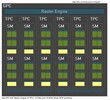NVIDIA GeForce RTX 3080 Max-Q vs Intel Iris Pro Graphics 580 vs NVIDIA GeForce RTX 3050 A Laptop GPU
NVIDIA GeForce RTX 3080 Max-Q
► remove from comparison
Die Nvidia GeForce RTX 3080 Max-Q (für Laptops, GN20-E7 Max-Q) bezeichnet eine GeForce RTX 3080 Laptop GPU mit Max-Q Technologien. Früher waren die Max-Q-Varianten die Stromsparversionen, mit der RTX 3000 Serie kann jedoch jede TGP-Variante mit Max-Q Technologien ausgestattet werden.
Intel Iris Pro Graphics 580
► remove from comparisonDie Intel Iris Pro Graphics 580 (GT4e) ist eine Prozessorgrafikkarte der im Sommer 2015 vorgestellten Skylake-Generation. Als Nachfolger der Iris Pro Graphics 6200 (Broadwell) ist die Iris Pro 580 dabei in ausgewählten Quad-Core-Modellen zu finden und besitzt einen dedizierten eDRAM-Cache mit 128 MB Kapazität. Die sogenannte GT4e-Ausbaustufe der Skylake-GPU verfügt zudem über 72 Execution Units (EUs) und damit deutlich mehr Rechenleistung als die GT2- (24 EUs) und GT3e-Ausbaustufen (48 EUs). Neben dem eDRAM-Cache kann die Iris 580 auch über das Interface des Prozessors auf den Hauptspeicher zugreifen (2x 64 Bit DDR3L-1600/DDR4-2133).
Im Unterschied zur Profi-Variante Iris Pro Graphics P580 ist die Iris 580 nicht in Xeon-Modellen, sondern herkömmlichen Quad-Core-CPUs der H-Serie zu finden, weist ansonsten aber keine bedeutsamen technischen Abweichungen auf.
Performance
Die exakte Leistung der Iris Pro Graphics 580 hängt unter anderem vom jeweiligen CPU-Modell sowie der Speicherbestückung ab. Im Optimalfall übertrifft die Performance knapp eine dedizierte GeForce 940M mit GDDR5-Speicher (GM108-Chip) und liegt damit in der Mittelklasse mobiler Grafikchips des Jahres 2015/2016. Aktuelle Spiele können zumeist in mittleren Einstellungen flüssig dargestellt werden.
Features
Die überarbeitete Videoeinheit decodiert nun auch H.265-/HEVC-Videos vollständig in Hardware und arbeitet dadurch deutlich effizienter als bislang. Die Bildausgabe erfolgt über DP 1.2/eDP 1.3 (max. 3.840 x 2.160 @ 60 Hz), wohingegen HDMI nur in der älteren Version 1.4 angeboten wird. Ein HDMI-2.0-Anschluss kann aber mittels Konverter von DisplayPort ergänzt werden. Maximal lassen sich drei Displays parallel angesteuern.
Leistungsaufnahme
Die Iris Pro Graphics 580 wird zunächst ausschließlich in Prozessoren der 45-Watt-Klasse verbaut und ist damit vorrangig in größeren Notebooks zu finden.
NVIDIA GeForce RTX 3050 A Laptop GPU
► remove from comparison
Die Nvidia GeForce RTX 3050 A Laptop GPU (oder Mobile) ist eine neue Variante basierend auf die aktuelle Ada Lovelace Architektur (im Vergleich zu Ampere bei den anderen RTX 3050 Laptop GPUs). Sie nutzt den AD106 Chip der RTX 4060 oder AD107 der RTX 4050, jedoch mit deutlich verringerter Kernanzahl und Speicherbus. Die RTX 3050 A bietet nur 1.792 GPU Kerne (CUDA Cores) und ein 4GB GDDR6 Grafikspeicher der nur mit 64-Bit angebunden ist. Nach aktuellen Informationen ist die 3050 A zum Launch nur für den Indischen Markt gedacht.
Durch die geringe Kernanzahl und den kleinen Speicherbus, sollte die Performance nicht deutlich überhalb der alten RTX 3050 4GB Laptop GPU liegen.
Der AD106 Chip wird bei TSMC im 5nm (4N) Verfahren gefertigt und ist dadurch deutlich effizienter als der alte Ampere Chip der RTX 3050 4GB. Der TGP kann vom Notebookhersteller zwischen 35 und 50 Watt gewählt werden (System Power).
| NVIDIA GeForce RTX 3080 Max-Q | Intel Iris Pro Graphics 580 | NVIDIA GeForce RTX 3050 A Laptop GPU | |||||||||||||||||||||||||||||||||||||||||||||||||||||||||||||||||||||||||||||||||||||||||||||||||||||||||||||||||||||||||||||||||||||||||||||||||||||||||||||||||||||||||||||||
| GeForce RTX 3000 Serie |
|
|
| ||||||||||||||||||||||||||||||||||||||||||||||||||||||||||||||||||||||||||||||||||||||||||||||||||||||||||||||||||||||||||||||||||||||||||||||||||||||||||||||||||||||||||||||
| Codename | GN20-E7 GA104 | Skylake GT4e | |||||||||||||||||||||||||||||||||||||||||||||||||||||||||||||||||||||||||||||||||||||||||||||||||||||||||||||||||||||||||||||||||||||||||||||||||||||||||||||||||||||||||||||||
| Architektur | Ampere | Gen. 9 Skylake | Ada Lovelace | ||||||||||||||||||||||||||||||||||||||||||||||||||||||||||||||||||||||||||||||||||||||||||||||||||||||||||||||||||||||||||||||||||||||||||||||||||||||||||||||||||||||||||||||
| Pipelines | 6144 - unified | 72 - unified | 1792 - unified | ||||||||||||||||||||||||||||||||||||||||||||||||||||||||||||||||||||||||||||||||||||||||||||||||||||||||||||||||||||||||||||||||||||||||||||||||||||||||||||||||||||||||||||||
| Kerntakt | 780 - 1245 (Boost) MHz | 350 - 1050 (Boost) MHz | |||||||||||||||||||||||||||||||||||||||||||||||||||||||||||||||||||||||||||||||||||||||||||||||||||||||||||||||||||||||||||||||||||||||||||||||||||||||||||||||||||||||||||||||
| Speichertakt | 6000 MHz | ||||||||||||||||||||||||||||||||||||||||||||||||||||||||||||||||||||||||||||||||||||||||||||||||||||||||||||||||||||||||||||||||||||||||||||||||||||||||||||||||||||||||||||||||
| Speicherbandbreite | 256 Bit | eDRAM + 64/128 Bit | 64 Bit | ||||||||||||||||||||||||||||||||||||||||||||||||||||||||||||||||||||||||||||||||||||||||||||||||||||||||||||||||||||||||||||||||||||||||||||||||||||||||||||||||||||||||||||||
| Speichertyp | GDDR6 | eDRAM | GDDR6 | ||||||||||||||||||||||||||||||||||||||||||||||||||||||||||||||||||||||||||||||||||||||||||||||||||||||||||||||||||||||||||||||||||||||||||||||||||||||||||||||||||||||||||||||
| Max. Speichergröße | 16 GB | 128 MB | 4 GB | ||||||||||||||||||||||||||||||||||||||||||||||||||||||||||||||||||||||||||||||||||||||||||||||||||||||||||||||||||||||||||||||||||||||||||||||||||||||||||||||||||||||||||||||
| Shared Memory | nein | ja | nein | ||||||||||||||||||||||||||||||||||||||||||||||||||||||||||||||||||||||||||||||||||||||||||||||||||||||||||||||||||||||||||||||||||||||||||||||||||||||||||||||||||||||||||||||
| API | DirectX 12_2, Shader 6.7, OpenGL 4.6 | DirectX 12_1, OpenGL 4.4 | DirectX 12_2, Shader 6.7, OpenGL 4.6 | ||||||||||||||||||||||||||||||||||||||||||||||||||||||||||||||||||||||||||||||||||||||||||||||||||||||||||||||||||||||||||||||||||||||||||||||||||||||||||||||||||||||||||||||
| Stromverbrauch | 80 Watt | 45 Watt (35 - 80 Watt TGP) | |||||||||||||||||||||||||||||||||||||||||||||||||||||||||||||||||||||||||||||||||||||||||||||||||||||||||||||||||||||||||||||||||||||||||||||||||||||||||||||||||||||||||||||||
| Herstellungsprozess | 8 nm | 14 nm | 5 nm | ||||||||||||||||||||||||||||||||||||||||||||||||||||||||||||||||||||||||||||||||||||||||||||||||||||||||||||||||||||||||||||||||||||||||||||||||||||||||||||||||||||||||||||||
| Notebookgröße | groß (17" z.B.) | mittel (15.4" z.B.) | |||||||||||||||||||||||||||||||||||||||||||||||||||||||||||||||||||||||||||||||||||||||||||||||||||||||||||||||||||||||||||||||||||||||||||||||||||||||||||||||||||||||||||||||
| Erscheinungsdatum | 04.01.2021 | 24.01.2016 | 26.07.2024 | ||||||||||||||||||||||||||||||||||||||||||||||||||||||||||||||||||||||||||||||||||||||||||||||||||||||||||||||||||||||||||||||||||||||||||||||||||||||||||||||||||||||||||||||
| Features | QuickSync | NVIDIA DLSS, NVIDIA Reflex, Resizable BAR, NVIDIA Broadcast, NVIDIA Ansel, NVIDIA ShadowPlay, NVIDIA G-SYNC, Advanced Optimus, Nvidia Max-Q, Dynamic Boost | |||||||||||||||||||||||||||||||||||||||||||||||||||||||||||||||||||||||||||||||||||||||||||||||||||||||||||||||||||||||||||||||||||||||||||||||||||||||||||||||||||||||||||||||
| PCIe | 4.0 | ||||||||||||||||||||||||||||||||||||||||||||||||||||||||||||||||||||||||||||||||||||||||||||||||||||||||||||||||||||||||||||||||||||||||||||||||||||||||||||||||||||||||||||||||
| Displays | HDMI 2.1, DisplayPort 1.4a | ||||||||||||||||||||||||||||||||||||||||||||||||||||||||||||||||||||||||||||||||||||||||||||||||||||||||||||||||||||||||||||||||||||||||||||||||||||||||||||||||||||||||||||||||
| Predecessor | GeForce RTX 3050 4GB Laptop GPU |
| ||||||||||||||||||||||||||
Benchmarks
Cinebench R15 OpenGL 64 Bit + Intel Iris Pro Graphics 580
Average Benchmarks Intel Iris Pro Graphics 580 → 0% n=0
* Smaller numbers mean a higher performance
1 This benchmark is not used for the average calculation
Spiele-Benchmarks
Die folgenden Benchmarks basieren auf unseren Spieletests mit Testnotebooks. Die Performance dieser Grafikkarte bei den gelisteten Spielen ist abhängig von der verwendeten CPU, Speicherausstattung, Treiber und auch Betriebssystem. Dadurch müssen die untenstehenden Werte nicht repräsentativ sein. Detaillierte Informationen über das verwendete System sehen Sie nach einem Klick auf den fps-Wert.

Overwatch
2016
Metal Gear Solid V
2015
Dota 2 Reborn
2015
Thief
2014
Metro: Last Light
2013
BioShock Infinite
2013
Guild Wars 2
2012
Sleeping Dogs
2012| Intel Iris Pro Graphics 580 | low | med. | high | ultra | QHD | 4K |
|---|---|---|---|---|---|---|
| Overwatch | 60.5 | 53.3 | 42.9 | 23.1 | ||
| Doom | ||||||
| Rise of the Tomb Raider | 30.2 | 18.2 | 12.2 | 8.9 | ||
| Fallout 4 | ||||||
| Metal Gear Solid V | 59.9 | 58.6 | 23 | 14.9 | ||
| Dota 2 Reborn | 59.8 | 37.2 | 15.3 | 14 | ||
| Batman: Arkham Knight | ||||||
| Thief | 43.8 | 30.1 | 25 | 12.4 | ||
| Metro: Last Light | 63.7 | 50.8 | 28.5 | 14.3 | ||
| BioShock Infinite | 101.3 | 57.9 | 51 | 14.9 | ||
| StarCraft II: Heart of the Swarm | 380.6 | 127.1 | 73.6 | 36.2 | ||
| Guild Wars 2 | 115.8 | 38.7 | 16.7 | |||
| Sleeping Dogs | 107.2 | 81.2 | 37.3 | 8.8 | ||
| < 30 fps < 60 fps < 120 fps ≥ 120 fps | 4 5 1 | 1 6 1 1 | 5 4 1 | 9 1 | | |
Eine Liste mit weiteren Spielen und allen Grafikkarten finden Sie auf unserer Seite: Welches Spiel ist mit welcher Grafikkarte spielbar?
















